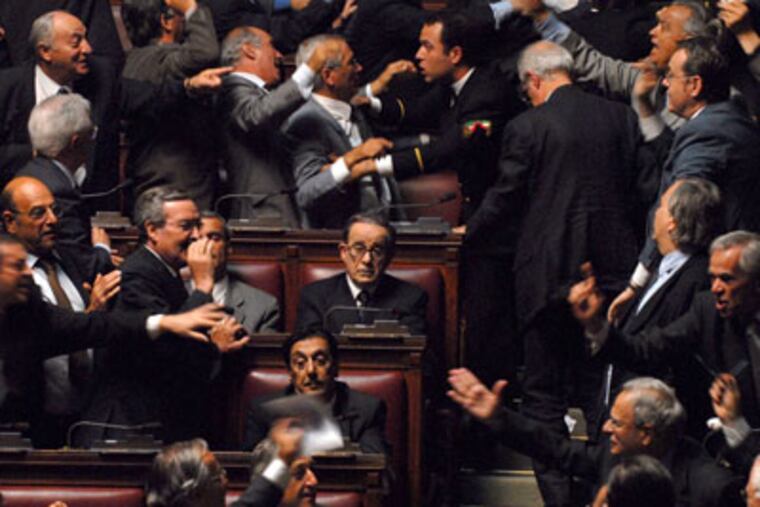A comic, tragic portrait of a powerful Italian politician
It wouldn't be fair to equate Giulio Andreotti, the disgraced but gracious former Italian prime minister, with Richard M. Nixon. Nixon admitted to abuse of executive privilege; Andreotti admitted nothing. Still, there's something Nixonian about the hubris of the figure nicknamed "the Black Pope" and "the Fox."

It wouldn't be fair to equate Giulio Andreotti, the disgraced but gracious former Italian prime minister, with Richard M. Nixon. Nixon admitted to abuse of executive privilege; Andreotti admitted nothing. Still, there's something Nixonian about the hubris of the figure nicknamed "the Black Pope" and "the Fox."
Andreotti - at 90, still a senator after acquittals on charges of murder, corruption, and collusion with the Mafia - made no public confessions. He merely shrugged to his prosecutors: "Except for the Punic Wars, I've been accused of everything."
Andreotti's accusers remained suspicious: "He is so capable at everything that he seems capable of anything."
This is precisely the point of filmmaker Paolo Sorrentino's Il Divo. The flamboyantly entertaining portrait of the Anton Ego of Italian politics breezily indicts its subject of complicity in 236 murders. (As politics and corruption are universals, knowledge of Italian current events is not necessary to understand the film.)
Il Divo - "the Divine," a sobriquet originally bestowed on Julius (Giulio) Caesar and his namesake Andreotti - is a hypnotic, hilarious, and indelibly tragic portrait of this specter haunting Italy's corridors of power.
Toni Servillo's stone-faced performance as the still point in the circus of Italian politics makes Machiavelli look about as dangerous as Dan Quayle.
Sorrentino frames his subject in the style of various Italian (and Italian American) masters. Pierced with acupuncture needles, Andreotti is a human dartboard like Caravaggio's St. Sebastian; casting his long shadow on a haunted piazza, he is the ghost in a de Chirico landscape. Impassive and oracular, he is a Mafia don in The Godfather.
Sorrentino's Andreotti, therefore, is a religious martyr, political puppeteer, capo di tutti capi - a figure equally at home in church, Senate, or Cosa Nostra.
In its highly varnished visual style and highly polished dialogue, Il Divo suggests how the religious, political, and crime bureaucracies are alike - and enmeshed. (Andreotti, you may remember, is the pontifical politician who told Pope John XXIII, "Excuse me, your Holiness, but you don't know the Vatican.")
The first three acts of Sorrentino's opera buffa are gleefully comic. But the film turns dead serious at the end, in a chilling fantasy sequence where the ordinarily composed Andreotti rages on the contradiction of doing evil to preserve good.
All in all, this phenomenal film illustrates Alexis de Tocqueville's observation that "The people get the government they deserve." In both meanings of the word, Il Divo is sensational.
EndText